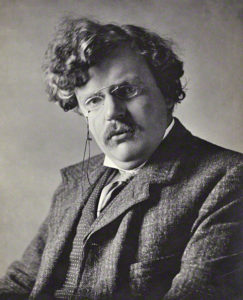
G.K.C. as M.C. is a collection of 37 book introductions written by G.K. Chesterton, selected and edited by J.P. de Fonseka (an interesting character himself). The introductions span from 1903 to 1929, and cover all sorts of book, primarily fiction, biography and literary essays. Originally published in 1929, G.K.C. as M.C. contains the usual treasure trove of thought-provoking passages.
Since the book is somewhat obscure, I thought I’d mention the passages that made the strongest impression on me. Enjoy!
“Every great philosophy, every great religion is founded not upon a diary, but upon a scrap-book.” (Boswell’s Life of Johnson)
“Many people have maintained the characteristic formula of modern skepticism, that Homer was not written by Homer, but by another person of the same name.” (The Book of Job, S. Wellwood)
“The Iliad may have been written by one man. It may have been written by a hundred men. But let us remember that there was more unity in those times in a hundred men than there is unity now in one man.” (The Book of Job)
“They do not understand the special tone and intention of the Old Testament; they do not understand the main idea, which is the idea of all men merely being the instruments of a higher power.” (The Book of Job)
“The modern habit of saying, ‘Every man has a different philosophy; this is my philosophy and it suits me’: the habit of saying this is mere weak-mindedness. A cosmic philosophy is not constructed to fit a man; a cosmic philosophy is constructed to fit a cosmos. A man can no more possess a private religion than he can possess a private sun and moon.” (The Book of Job)
“In dealing with the arrogant asserter of doubt, it is not the right method to tell him to stop doubting. It is rather the right method to tell him to go on doubting, to doubt a little more, to doubt every day newer and wilder things in the universe, until at last, by some strange enlightenment, he may begin to doubt himself.” (The Book of Job)
“The refusal of God to explain His design is itself a burning hint of His design. The riddles of God are more satisfying than the solutions of man.” (The Book of Job)
“Instead of proving to Job that it is an explicable world, He insists that it is a much stranger world than Job ever thought it was.” (The Book of Job)
“If prosperity is regarded as the reward of virtue it will be regarded as the symptom of virtue. Men will leave off the heavy task of making good men successful. They will adopt the easier task of making our successful men good.” (The Book of Job)
“It is vain indeed to speak of conservatism in this world, except as a convenient party label. Unless we are always changing things for the better, they are always changing themselves for the worse.” (The Cottage Homes of England, by W.W. Crotch)
“We must go back to freedom or forward to slavery. The free man of England, where he still exists, will doubtless find it a colossal enterprise to unwind the coil of three centuries. It is very right that he should consider the danger and pain and heart-rending complication involved in unwinding that coil. But it is also proper that he should consider the alternative; and the alternative is being strangled.” (Cottage Economy, by William Cobbett)
“And it was about the same time that, having for some time held the Anglo-Catholic position, he joined the Roman Catholic Church. It is notable, in connection with the general argument, that while the deeper reasons for such a change do not concern a sketch such as this, he was again characteristically amused and annoyed with the sentimentalists, sympathetic or hostile, who supposed he was attracted by ritual, music, and emotional mysticism. He told such people, somewhat to their bewilderment, that he had been converted because Rome alone could satisfy the reason.” (A History of the United States, by Cecil Chesterton)
“I prefer the philosophical results of a man examining a mole-hill, rather than those of a million moles exploring a mountain.” (Life in Old Cambridge, by M.E. Monckton Jones)
“Many amiable sociologists will say, as he did, ‘Let them die and decrease the surplus population.’ The improved proposal is that they should die before they are born.” (A Christmas Carol, by Charles Dickens)
“The answer to anyone who talks about the surplus population is to ask him whether he is the surplus population, or if he is not, how he knows he is not.” (A Christmas Carol)
“He [Scrooge] partook of gruel while his nephew partook of punch; but it never occurred to him that he could forcibly forbid a grown man like his nephew to consume punch, or coerce him into consuming gruel.” (A Christmas Carol)
“A self-contained and self-centered humanity would chill us in the same way as a self-contained and self-centered human being.” (Will Men be like Gods? by O.F. Dudley)
“The dislike of moralizing is entirely a mature or adult dislike. It comes from certain complexities that we know better than children do; but which we are not necessarily the better for knowing.” (Grandmamma’s Book of Rhymes, by Elizabeth Turner)
“In modern times we have had a vast increase in the sort of education that the ignorant can impose and a vast decrease in the sort of instruction that only the instructed can provide.” (The Change: Essays on the Land, by G. C. Heseltine)
Thanks to The American Chesterton Society for alerting me to the existence of this book in a recent edition of Gilbert.
(Image Credit – Wikimedia Commons)

Berrmot, I must say that you have a rather eclectic reading habit and I’m glad you do. Thanks for sharing and Happy New Year.
Bill
Thanks for reading, Bill – Happy New Year!